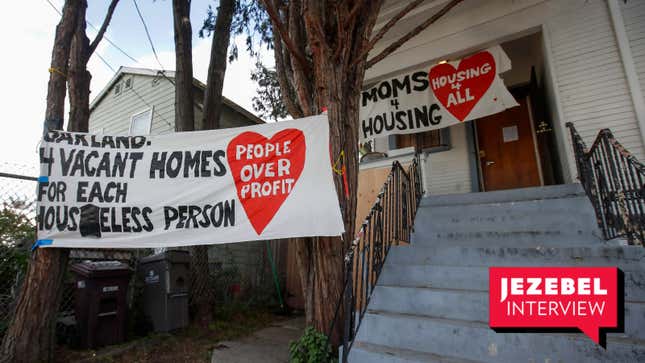'We Needed to Do Something to End This:' Why a Group of Black Moms Took Over a Vacant House in Oakland
In Depth
In November of of last year, a group of black mothers—Dominique Walker, Tolani King, Sameerah Karim, Sharena Thomas, and Misty Cross—moved into a shabby white house in Oakland that had sat vacant for two years. They called themselves Moms 4 Housing, and they had taken the radical but beautifully simple step of moving into the home, which was owned by a real estate investment company notorious for buying foreclosed homes and then flipping them for a tidy profit. At the time, they, like an increasing number of black Bay Area residents and families, were unhoused, or teetering on the edge of being unhoused.
They wanted a home for them and their children, but they also wanted their action to be a clarion call for change—all around them were empty, and expensive, homes, sitting vacant in the midst of a mushrooming homelessness and affordability crisis that has pushed largely black people and families in the Bay Area out of their neighborhoods, forcing them to move to other cities in search of cheaper housing or too often, into a crowded and unsafe shelter system, expensive motels, the couches of their friends and family members, or onto the streets. They pinned the blame squarely on companies like Wedgewood Properties, the owner of the home they occupied, which had bought the house for just over half a million dollars in July at a foreclosure auction.
“We decided that we needed to do something to end this,” Dominique Walker, one of the co-founders of Moms 4 Housing and an organizer with the Alliance of Californians for Community Empowerment, told Jezebel. “So out of complete desperation, we wanted to reclaim houses back from speculators. We wanted to provide shelter for our children.” Walker added, “And we wanted to make it very public and bring awareness to the bigger issue, because it was never just about us.”
Walker and the other women lived in the house for two months, raising their children and mounting a campaign to get Wedgewood to sell it to a community land trust.
Ultimately, Moms 4 Housing won—on January 20, days after a much-criticized pre-dawn eviction of the women and their children by the Alameda County Sheriff’s office, the group announced that they and the Oakland Community Land Trust had reached an agreement with Wedgewood to buy the house they had reclaimed, along with other concessions.
Jezebel spoke with Dominique Walker about why she and the other women decided to move into the vacant home, how working families are the new face of homelessness in America, and what she believes needs to happen in order to tackle the housing crisis in the Bay Area and in cities around the country. The following interview has been edited for length and clarity.
JEZEBEL: Why did you co-found Moms 4 Housing after you moved back home to Oakland?
DOMINIQUE WALKER: I would hear my family members say, “Oh, I’m going to move to Stockton, it’s cheaper, I’m moving to Vallejo, I’m moving to Antioch, I‘m going to Sacramento.” And I’m like, okay, everybody’s just moving. But when I got home and actually saw the result of the displacement of our people in Oakland, with seven out of ten [homeless people] being African-American, it was very alarming to me.
And then I became homeless. I was staying with a family member back in Stockton. That didn’t work. Then I was staying in a hotel, which was very unsafe and violent. And I was very vulnerable.
-

-

-

-

-

-

-

-

-

-

-

-

-

-

-

-

-

-

-

-

-

-

-

-

-

-

-

-

-

-

-

-

-

-

-

-

-

-

-

-








































